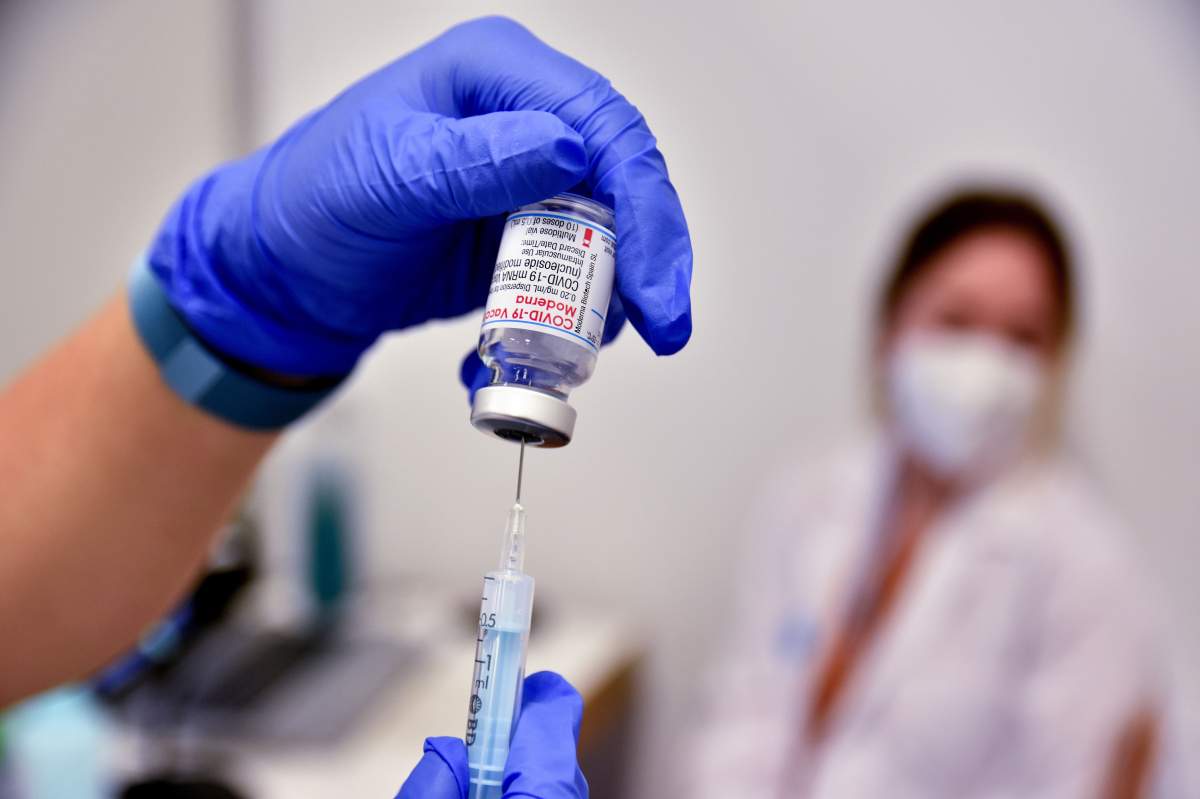As deliveries of Moderna’s and Pfizer’s COVID-19 vaccines “ebb and flow” over the next few weeks, officials in London, Ont., are reassuring residents concerned about mixing and matching the two mRNA vaccines.

The Middlesex-London Health Unit announced Sunday that three of its mass vaccination clinics would only be offering adults Moderna’s vaccine this week, due to a delayed delivery of Pfizer’s vaccine.
During the MLHU’s COVID-19 update on Monday, medical officer of health Dr. Chris Mackie added that, even beyond this week, people need to get comfortable with the idea of mixing and matching the Pfizer and Moderna mRNA vaccines.
“We’re already being told that there may be a reduction in Pfizer availability early July, but then a big bump of Pfizer availability increasing later in July. So it will be a bit of back and forth and doing our best to make sure that we don’t have to cancel any appointments and that we can get vaccine to people when they need it,” he explained.
“But absolutely, we need people to wrap their minds around the concept that Pfizer and Moderna are the same drug with different brands.”
London, Ont., Mayor Ed Holder likened the current situation to the discourse surrounding the choice to extend the interval between doses to four months in order to get first doses into more arms.
“It’s fair to say that several months later that that decision was absolutely the right one, saved lives and kept thousands from getting sick. The same is true, if not moreso, today when it comes to mixing and matching vaccines,” Holder said Monday.

Get weekly health news
“It’s so important as increasing numbers of our people in our region go for second shots to trust the science and trust the advice of our public health professionals. Mixing and matching vaccines is not only safe, it’s highly effective.”
Vaccines work by stimulating our immune cells to grow and communicate with each other, giving directions on where to set up for an impending attack by the virus, University of Ottawa microbiologist Earl Brown explained earlier this year.
Both the Pfizer and Moderna mRNA vaccines work by giving immune cells instructions to produce antibodies against the virus. Viral vector vaccines like the AstraZeneca and Johnson & Johnson vaccines, meanwhile, force an immune response from the harmless version of the virus that’s injected with those shots.

Mackie says he understands the public may be upset about the potential mixing and matching, but the decisions are being made based on the latest science.
“We’ve been saying all along, until now, that people shouldn’t be mixing and matching from different doses of different vaccines, but we now know that that’s safe and effective.”
So far, he said, only a handful of people who received a first dose of the Pfizer vaccine have chosen not to receive a second dose of the Moderna vaccine when offered.
“If we started to see this in any significant scale, it would impact the vaccine roll out and it would impact the duration of the pandemic,” he added. “I’m hoping that we don’t see more of that.”
As part of its announcement on Sunday, the MLHU stated that the interchangeability of mRNA vaccines has been supported by experts at both the Public Health Agency of Canada (PHAC) and the National Advisory Committee on Immunization (NACI)
On June 1, PHAC released updated recommendations from NACI on “the interchangeability of authorized COVID-19 vaccines” based on “current scientific evidence and NACI’s expert opinion.”
NACI recommended that those who received an mRNA vaccine receive the same vaccine for their second dose but said if it’s not readily available “another mRNA vaccine can be considered interchangeable and should be offered to complete the vaccine series.”
The recommendations also stated that mixing and matching is not an untested concept.
“Different vaccine products have been used to complete a vaccine series for influenza, hepatitis A, and others,” NACI writes.
The provincial government has also been encouraging residents to get fully immunized as soon as possible by taking the most readily available second dose.
“If you had Moderna or Pfizer for your first dose you can safely take either for your second. If you had AstraZeneca for your first dose you can safely take AstraZeneca, Moderna or Pfizer for your second,” Health Minister Christine Elliott said on Twitter on Monday.
— with files from Global News’ Andrew Graham and Kelly Wang as well as The Canadian Press.














Comments